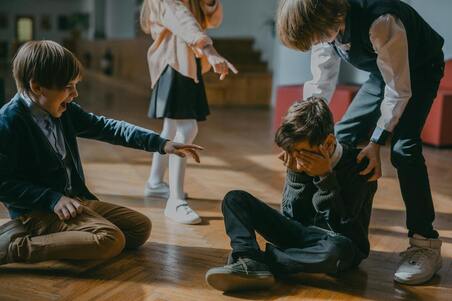|
Bullying has far reaching impacts for kids and home life. After a child is bullied they may not be their usual happy self, they may be more defiant, they may be more aggressive or on the opposite end more reserved than usual. This can be a hard thing for parents and children to navigate. Already if your child has been able to share with you this is happening to them, it speaks to their trust in you as a parent to be there for them. It is important to reaffirm to your child you hear them and you are glad they were brave enough to share. As often the embarrassment and rejection of being bullied may keep kids in silence. Here are some ways to approach it with your child: 1. Inform the school. It is important that someone in the school has been notified of the bullying incident. Whether your child told the teacher, which is an important step to take to stop the bullying for many reasons. Some of those reasons include: bullying other children can be an indication that the bully may being having their own challenges and need support, the teacher being aware can monitor the situation, and the child who was bullied giving voice and being heard about their experience is invaluable to moving past the bullying. Usually the teacher is the first person to get support from and are really supportive of children to help everyone be safe. If for any reason the teacher is not able to help your child, then as the parent try reaching out to the teacher, and if this does not work reach out to the school principal.
2. Allow Space for Thoughts, Feelings and Questions. It is important to allow your child to share their thoughts and feelings about the experience, whatever they are ready to share before jumping to problem-solving or plans. They may want to talk it out or draw it out, let your child choose; having a sense of choice after an experience of being bullied where the child had no choice is important. If the experience is overwhelming for your child or impacting their day to day functioning consider getting support. I have helped many kids heal from bullying and have tools to navigate if it happens again in the future. 3. Create a Plan with Your Child. Start with having your child share what steps they think would be helpful to do if the bullying happens again. Typically first it is helpful for the child to use their "strong voice", and tell the bully to stop, for example "I don't like when you _______. If you don't stop I am going to __________." Then the child needs to follow through with what they said they are going to do, like tell the teacher, so the bully knows they are serious and will hold the boundary they set (as this is sending a clear message to the bully). Lastly, make sure your child knows to keep sharing about any future bullying with you and another trusted adult, sharing helps them to not feel alone in their experience. 4. Continue to Allow Space to Share. Check-in with your child in the first few weeks daily to see if there was any other bullying occurrences. Then if there are none, space to every few days and then once a week until a period of a two to three months has passed. This shows your child they have the space to share, and as the parent you are listening and want to know what is happening in their school life. If bullying continues reach out directly to the teacher and school, and express your concerns; most schools have a zero tolerance bully policy.
0 Comments
Leave a Reply. |
AuthorI am a Registered Psychotherapist and Art Therapist. And I have been writing this blog since May 2021 about various topics including parenting, supporting adult and child mental health, and holistic approaches. The intention of this blog is to provide resources and information to others, however it is not intended to take the place of therapy. If you have any questions about anything written please reach out to me. Archives
March 2024
Categories |
Telephone |
|


 RSS Feed
RSS Feed